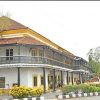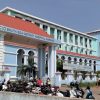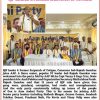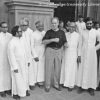Goa is abuzz with excitement as vintage bike and car owners, users, collectors and fans are decking […]
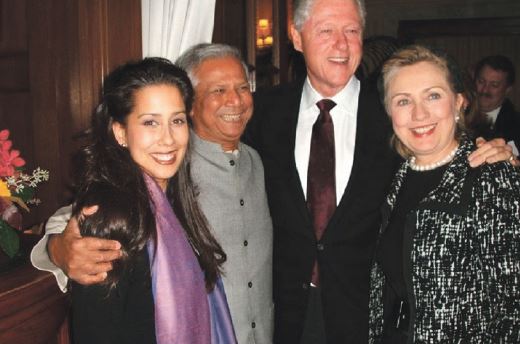
WITH PATRONIZATION OF CIA AND CLINTONS, NOBEL LAUREATE MOHAMMAD YUNUS ATTEMPTS TO CREATING PATH FOR COUP D’ÉTAT IN BANGLADESH!By Salah Uddin Shoaib Choudhury
Aug 10- Aug 16 2024, In the News August 9, 2024By Salah Uddin Shoaib Choudhury
REUTERS has catered an interview of Mohammed Yunus, known as the “father” of microcredit, who jointly received Nobel Peace Prize along with Grameen Bank in 2006, which clearly reflects his actual desire of returning to politics and ultimately become head of the government in Bangladesh – a long-cherished dream that could not see the light despite frantic bids of Hillary Clinton as well as few other top brasses in the Democratic Party. By now, this interview has already appeared in a section of media outlets in the world as well as in Bangladesh. One of the key goals of this interview is to portray Bangladesh being turned into a “one party state” and to brand the ruling Awami League government led by Prime Minister Sheikh Hasina as authoritarian. Furthermore, Yunus attempts to also put January 7 elections into controversy by stating it was “boycotted by the main opposition party, whose top leaders were either jailed or in exile ahead of the polls.”
It may be mentioned here that Al Qaeda-connected Bangladesh Nationalist Party (BNP) boycotted the election thinking it would succeed in returning to power through an unconstitutional path with active support from the Biden administration, as Hunter Biden has been working as its lobbyist for years. Chairperson of BNP, Khaleda Zia, is serving rigorous imprisonment on charges of misappropriating funds of an orphanage, while her son, Tarique Rahman – acting chairman of the party, has been living in self-exile in the United Kingdom since 2007, whereas he faces two life-term sentences for his direct involvement in terrorist attacks on Sheikh Hasina as well as cross-border terrorism for his foiled attempt of supplying weapons and explosives to separatist groups in India.
WHILE Reuters in the interview says, “Prof Yunus, who helped to lift millions from poverty by providing tiny loans of sums less than $100 to the rural poor, angered Hasina with a 2007 plan to set up a political party,” reality is just the opposite. While jointly receiving the Nobel Peace Prize along with Grameen Bank from Professor Ole Danbolt Mjøs, Chairman of the Norwegian Nobel Committee on December 10, 2006 for “their efforts to create economic and social development from below,” in presence of global dignitaries, Muhammad Yunus declared – “We can put poverty in the museum.” Commenting on Yunus, UK daily The Guardian in an article said: “For Nelson Mandela it was apartheid, for Mahatma Gandhi it was self-rule, for Prof Yunus it is poverty.”
After 17 years of receiving the prestigious prize – Muhammad Yunus has not succeeded in sending poverty to museums. Instead, millions of borrowers of loan from him in Bangladesh now are facing cruel sufferings due to poverty while most possibly, Yunus has engaged ‘reputation management’ firms to remove everyone on the web about his pronouncement of sending poverty to museums. Why?
Danish investigative journalist Tom Heinemann, revealed a number of secret documents proving how Muhammad Yunus back in the mid-90’s transferred 100 million dollars – where most was donated as grants from Norway, Sweden, Germany, the United States and Canada – to a new company in the Grameen-family – mostly owned by his family members – in order to dodge taxes.
TOM Heinemann also exposed how Muhammad Yunus was charging high-interest rates ranging between 21 to 37 percent from the vulnerable poor female borrowers, although Yunus was receiving the majority of the fund as grant from various countries in the world.
Taking a lead from a series of investigative reports published in Weekly Blitz, Tom Heinemann also tried to dig further into the case of Sufia Begum, the poster-woman of Yunus and Grameen Bank.
The story of Sufia Begum reads like this: Yunus gave BDT 20 [US$ 0.25] to Sufia Begum of Jobra village years back as loan with the condition of returning in time with interest. Sufia returned that money and got a second loan of BDT 500 from Yunus. She was so excited that she spread the news in the entire village. This was the beginning of the Grameen Bank concept. But, most of the borrowers, who took money from Yunus, gradually turned from poor to poorest as they were compelled to pay regular interest at high rates. In Jobra village alone, a large number of villagers have already been turned into paupers by Yunus and his Grameen Bank.
Yunus and his Grameen Bank projected Jobra village and Sufia as examples of their “excellent success stories” to the international audience. Through such a campaign, Yunus has attained tremendous attention from the international community, including journalists.
Weekly Blitz also reported that Yunus took former US first lady Hillary Clinton at Grameen Bank’s project situated at Rishi Palli at Moshihati in Bangladesh, where Yunus initiated a project named ‘Hillary Adarsha Palli’ (Hillary Model Village) and promised locals of providing loans, homes and better lives.
WHILE Hillary Clinton was deeply impressed at this venture and as Yunus gave her assurance of providing soft-term loans to the poor villagers, in reality, the villagers were made to pay 30-40 percent interest – while the majority of them received nothing. In fact, to impress Hillary Clinton, Yunus brought truck-loaded people from other areas and presented them as residents of proposed ‘Hillary Model Village’, while the crowd were sent back immediately after Hillary Clinton’s departure.
After the visit of Hillary Clinton, the entire village turned into a land of horror. Extreme poverty due to high interest charged by the Grameen Bank pushed them towards starvation, poverty and compelling many of them to commit suicide. Child marriage is very common in that village. A large number of females from the village ended up in local and neighbouring brothels, as they were virtually sold by parents due to poverty. Now, ‘Hillary Model Village’ has turned into a big joke to the locals. But Yunus was successful in tactfully suppressing this fact from the attention of Hillary Clinton. Tom Heinemann has also covered this issue in his documentary named ‘The Micro Debt.’
It may be mentioned here that, Yunus is one of the key donors of Clinton Foundation while Hillary Clinton had illegally used her position in the State Department to award more than US$13 million in grants to Yunus, contracts and loans despite his ouster from Grameen Bank in 2011. Funds were given to Yunus through 18 separate US Agency for International Development (USAID) award transactions listed by the federal contracting site USAspending.gov.
Other federal agencies also opened their coffers to Yunus after Clinton entered the administration. The Department of Treasury awarded a US$600,000 grant directly to Grameen America under a fund designed to boost financial institutions in community development. A Treasury Department spokesman declined to provide any details beyond the fact the funds were for activities in New York.
A series of Small Business Administration grants to Grameen America also began in July 2011, totaling US$934,000. Those grants were for “salaries and expenses” for the foundation to operate its New York offices where Hillary Clinton once was a US senator.
Clinton even went further by attempting to bully the Bangladesh government to force it to end the corruption investigation of Yunus. According to the US Congress, Hillary Clinton used hard-ball tactics against the Awami League government in Bangladesh in order to help her ruthlessly corrupt millionaire friend. The document shows Hillary Clinton deployed an array of high-powered officials at the Department of State, US Embassy in Bangladesh and World Bank to rescue Muhammad Yunus from corruption and financial crime charges.
ALTHOUGH the Clinton Foundation website earlier declared that Muhammad Yunus had donated US$300,000 from his millions of dollars deposited in various foreign banks, the link to this declaration on the Clinton Foundation website has been mysteriously removed by Clintons. A report from the Daily Mail said some of the claims involved allegedly illegal donations with the intent of buying influence with Hillary Clinton, who at the time was trying to become president. While Yunus’ net worth is estimated at US$10 million, his actual wealth size is much higher.
Hillary Clinton repeatedly and directly threatened Bangladesh on behalf of Muhammad Yunus, warning Bangladesh Prime Minister Sheikh Hasina that the World Bank could revoke a previously approved US$1.2 billion loan to build the Padma Bridge. Subsequently, at the request of Yunus, Hillary Clinton had exerted direct influence of the World Bank officials, while it is also alleged that she had used the Federal Investigation Agency (FBI) and the Central Intelligence Agency (CIA) in blackmailing at least two key officials of the World Bank thus compelling them in cancelling the approved loan for the Padma Bridge.
Hillary Clinton took full advantage and wielded tremendous pressure as the United States being the largest donor to the World Bank, which in 2011 contributed US$1.50 billion to the bank.
Former Secretary of State Hillary Clinton’s mixing of official work with foundation donors is reportedly the focus of a second, less publicized FBI public corruption investigation of the former secretary of state. The more widely known FBI probe focuses on her use of a private email server located in her New York residence to conduct official government business.
Emails from Hillary Clinton’s private server disclose that Bill and Hillary Clinton closely monitored the Bangladesh government’s investigation of Muhammad Yunus.
David Bossie, president of the conservative activist group Citizens United and a long-time Clinton critic, called for the FBI to look into possible conflicts of interest linked to the long association between Yunus and the Clintons.
“The mixing of State Department and US government business with Clinton Foundation donors and interests is a prime example of what the FBI could be investigating in addition to the private email server setup,” Bossie told The Daily Caller News Foundation.
When back in January 11, 2007 an army- backed interim government came to power, Hillary Clinton made frantic bids in influencing the key figures of that government to consider Muhammad Yunus as the “new leader of Bangladesh,” by executing “minus-two formula” of forcing Sheikh Hasina and Khaleda Zia into retirement and forced exile. The BBC reported April 7, 2007 that “the army would sponsor Nobel Peace prize winner Dr Muhammad Yunus as a new leader.”
Sudden interview of Yunus to Reuters is not a mere media stunt. It is a part of joint conspiracy of Clintons and Yunus to create atmosphere for ‘Bangla Spring’ or staging a coup d’état in Dhaka.
(Note: Salah Uddin Shoaib Choudhury is an internationally acclaimed multi-award-winning journalist, writer, research-scholar, counterterrorism specialist and editor, Blitz, a newspaper publishing from Bangladesh since 2003. He regularly writes for local and international newspapers. Follow him on X @Salah_Shoaib)
